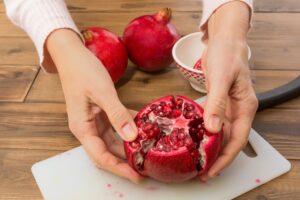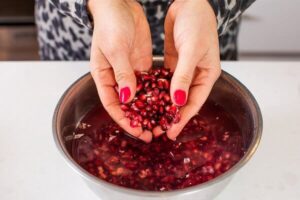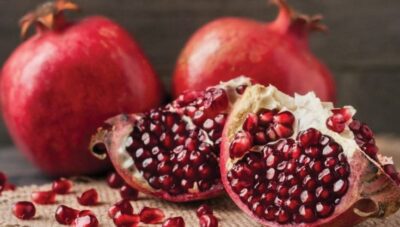When it comes to feeding your bearded dragon, it’s essential to ensure their diet is both nutritious and safe. While bearded dragons are known for their diverse diet, including various fruits and vegetables, it’s crucial to know which foods are suitable for them. One fruit that often piques curiosity is pomegranate. So, can bearded dragons have pomegranate?
Bearded dragons can eat pomegranate, but it should be offered in moderation. Pomegranate is rich in vitamins and antioxidants, which can be beneficial to your bearded dragon’s health. However, due to its high sugar content and the presence of seeds, it’s important to feed pomegranate sparingly.
In this article, we’ll explore whether this vibrant fruit can be a healthy addition to your bearded dragon’s diet and what you should consider before offering it to your scaly friend.
Can Bearded Dragons Eat Pomegranate?

Yes, bearded dragons can eat pomegranate, but it should be offered in moderation. Pomegranate is high in antioxidants and vitamins, which can be beneficial, but it also contains sugars and acids that could be harsh on a bearded dragon’s digestive system if given too frequently.
When feeding pomegranate to your bearded dragon, make sure to:
- Serve it in small amounts: A few seeds or a small amount of the fruit is sufficient.
- Remove seeds carefully: The seeds can be a choking hazard or cause digestive issues.
- Monitor for any adverse reactions: Watch your bearded dragon for any signs of digestive upset after introducing new foods.
It’s always a good idea to consult with a vet who specializes in reptiles before making significant changes to your pet’s diet.
Nutritional Value of Pomegranate to Bearded Dragons
Pomegranate has several nutritional benefits, but it should be given to bearded dragons in moderation. Here’s a breakdown of its nutritional components and their relevance to bearded dragons:
- Vitamins:
- Vitamin C: Supports immune function and overall health. Pomegranate is a good source of Vitamin C, but bearded dragons can obtain sufficient Vitamin C from other fruits and vegetables.
- Vitamin A: Important for vision and skin health. Pomegranate has some Vitamin A, but it’s not a significant source compared to other fruits and vegetables.
- Antioxidants:
- Pomegranates are rich in antioxidants, which help combat oxidative stress and inflammation. While beneficial, bearded dragons primarily need antioxidants from other vegetables and fruits in their diet.
- Minerals:
- Potassium: Helps with muscle and nerve function. Pomegranate contains potassium, but there are other sources that are better suited for bearded dragons.
- Calcium: Essential for bone health. Pomegranate has minimal calcium compared to other fruits and vegetables.
- Sugars:
- Pomegranates are high in natural sugars, which can contribute to obesity and other health issues if fed in excess.
- Fiber:
- Provides digestive benefits, but too much fiber from fruit can sometimes lead to digestive issues if not balanced with other parts of the diet.
Overall, while pomegranate offers some beneficial nutrients, it should be considered a treat rather than a staple food. A balanced diet for bearded dragons typically includes a variety of vegetables, fruits, and protein sources to meet their nutritional needs.
Potential Risks and Side Effects
While pomegranate can be a nutritious treat for bearded dragons, there are potential risks and side effects to be aware of:
- Digestive Upset:
- Acidity: The acidity in pomegranate can cause digestive issues, including diarrhea or stomach upset, especially if given in large amounts.
- High Sugar Content: Excessive sugar intake can lead to obesity and related health problems.
- Choking Hazard:
- Seeds: The seeds of pomegranate can be a choking hazard or cause blockages in the digestive tract. Always remove seeds before offering the fruit.
- Nutrient Imbalance:
- Calcium-to-Phosphorus Ratio: Pomegranate has a higher phosphorus content compared to calcium. A diet high in phosphorus relative to calcium can lead to metabolic bone disease in bearded dragons. Ensure that pomegranate is only a small part of a varied diet to maintain proper calcium and phosphorus balance.
- Allergic Reactions:
- Although rare, some bearded dragons might have allergies or sensitivities to certain fruits. Monitor your pet for any signs of an allergic reaction when introducing new foods.
- Impact on Hydration:
- Diuretic Effect: The high water content in pomegranate might have a mild diuretic effect. Ensure that your bearded dragon is drinking enough water and stays properly hydrated.
When introducing pomegranate or any new food into your bearded dragon’s diet, start with small amounts and observe how they respond. Always prioritize a balanced diet with a variety of appropriate foods.
How to Introduce pomegranate to Bearded Dragons

Introducing pomegranate to your bearded dragon should be done gradually to ensure they tolerate it well. Here’s a step-by-step guide:
- Preparation:
- Remove Seeds: Carefully extract the seeds from the pomegranate, as they can be a choking hazard or cause digestive issues.
- Cut into Small Pieces: Chop the pomegranate into very small, manageable pieces. This helps prevent choking and makes it easier for your bearded dragon to eat.
- Start with a Small Amount:
- Offer a tiny portion of pomegranate to your bearded dragon. A few pieces or seeds are sufficient as a first introduction.
- Observe for Reactions:
- Watch your bearded dragon closely for any signs of digestive upset or allergic reactions, such as changes in stool consistency or behavior.
- Monitor and Adjust:
- If your bearded dragon seems to handle pomegranate well, you can gradually increase the amount. However, limit it to occasional treats rather than a regular part of their diet.
- Combine with Other Foods:
- Mix pomegranate with their usual diet of vegetables and proteins to ensure a balanced intake. You can offer it alongside leafy greens or other safe fruits.
- Hydration:
- Ensure your bearded dragon has access to fresh water at all times. Even though pomegranate has high water content, maintaining proper hydration is crucial.
- Frequency:
- Treat pomegranate as an occasional treat rather than a regular food. Limit offerings to once or twice a week to avoid potential issues from overconsumption.
By following these steps, you can safely introduce pomegranate to your bearded dragon’s diet and enjoy the benefits of this fruit in moderation.
Frequently asked questions
- Can bearded dragons eat pomegranate?
- Yes, bearded dragons can eat pomegranate in moderation.
- How often can I give my bearded dragon pomegranate?
- Pomegranate should be given as an occasional treat, about once or twice a week.
- What part of the pomegranate can bearded dragons eat?
- Only the flesh of the pomegranate is safe. Remove all seeds before offering it.
- Are pomegranate seeds harmful to bearded dragons?
- Yes, pomegranate seeds can be a choking hazard and may cause digestive problems. Always remove seeds.
- Can pomegranate cause any health issues for bearded dragons?
- If fed in excess, pomegranate can cause digestive upset due to its acidity and high sugar content.
- How should I prepare pomegranate for my bearded dragon?
- Chop the pomegranate into small, manageable pieces and remove all seeds before offering it.
- Is pomegranate high in nutrients for bearded dragons?
- Pomegranate contains beneficial antioxidants and some vitamins but should not replace a balanced diet.
- Can pomegranate affect my bearded dragon’s hydration?
- While pomegranate has high water content, ensure your bearded dragon always has access to fresh water.
- What should I do if my bearded dragon has a negative reaction to pomegranate?
- Stop offering pomegranate and consult a vet if you notice any signs of digestive upset or other health issues.
- Are there any better fruit options for bearded dragons than pomegranate?
- Yes, fruits like blueberries, strawberries, and melons are often better choices due to their lower acidity and balanced nutrients.
Conclusion
Can bearded dragons have pomegranate? Yes, bearded dragons can eat pomegranate, but it should be given only as an occasional treat. Pomegranate offers some beneficial nutrients but also has high acidity and sugar content, which can cause digestive issues if fed in excess.
Always remove seeds and monitor your bearded dragon for any adverse reactions. For a balanced diet, it’s best to focus on a variety of vegetables and fruits that meet their nutritional needs.

